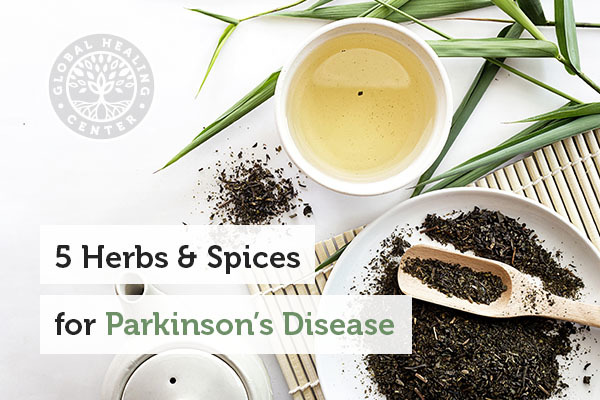
Parkinson’s disease, a chronic, degenerative disorder of the nervous system, results from dopamine-producing brain cell deficiency. Rather than spend time and money on allopathic treatments that can often do more harm than good, there are natural remedies you can take that may effectively combat Parkinson's. In particular, herbs and spices for Parkinson's disease are among the most researched.
Top Herbs and Spices
1. Brahmi
Also known as Bacopa, this Ayurvedic herb is often used in the United States as water plants in aquariums. Some practitioners like Ray Sahelian, MD, advocate its use as a memory enhancement as it has been used for centuries in India. According to University of Maryland Medical Center studies, brahmi may improve circulation to the brain and even protect brain cells. Another study by Pennsylvania State University College of Medicine applied brahmi seed powder to rodent models of Parkinson’s. Results showed promise in conquering the disease and protecting the brain from damage.
2. Cowhage
A popular herb in India, cowhage, or kapikachu, is found in bushes of lowland forests throughout the country. It drew the attention of the University of Maryland Medical Center, which speculated that cowhage, which contains levodopa or L-dopa, might perform better than L-dopa administered as a drug against Parkinson’s disease.
3. Turmeric
We can’t stop talking about turmeric, and there’s many reasons why. Michigan State University researcher Basir Ahmad seems to be a fan of it, too [3]. He led a team of researchers who found that curcumin, a compound of turmeric, may help fight Parkinson’s disease by disrupting proteins responsible for the disease and preventing said proteins from aggregating.
4. Gingko Biloba
Ginkgo remains a potentially beneficial herb for Parkinson’s sufferers. In a 2012 study at the National Institute of Neurology and Neurosurgery in Mexico, a patented extract of ginkgo leaves were dispensed to animal models of Parkinson’s [4]. The extract showed neuroprotective and neurorecovery effects against midbrain dopamine neuron damage and even damage to locomotion. Researchers declared, “These studies suggest it as an alternative in the future treatment of PD.”
Extra Tip
Certified organic virgin cold pressed coconut oil is also being used to aid the symptoms of parkinson's. People are getting good results with 1 tablespoon 2-3x daily.
References (4)
- Ahmad B, Lapidus LJ. Curcumin prevents aggregation in α-synuclein by increasing reconfiguration rate. J Biol Chem. 2012 Mar 16;287(12):9193-9. doi: 10.1074/jbc.M111.325548. Epub 2012 Jan 20.
- Ahmad B, Lapidus LJ. Curcumin prevents aggregation in α-synuclein by increasing reconfiguration rate. J Biol Chem. 2012 Mar 16;287(12):9193-9. doi: 10.1074/jbc.M111.325548. Epub 2012 Jan 20.
- Ahmad B, Lapidus LJ. Curcumin prevents aggregation in α-synuclein by increasing reconfiguration rate. J Biol Chem. 2012 Mar 16;287(12):9193-9. doi: 10.1074/jbc.M111.325548. Epub 2012 Jan 20.
- Rojas P, Montes P, Rojas C, Serrano-García N, Rojas-Castañeda JC. Effect of a phytopharmaceutical medicine, Ginko biloba extract 761, in an animal model of Parkinson's disease: therapeutic perspectives. Nutrition. 2012 Nov-Dec;28(11-12):1081-8. doi: 10.1016/j.nut.2012.03.007. Epub 2012 Jul 17. Review.
†Results may vary. Information and statements made are for education purposes and are not intended to replace the advice of your doctor. If you have a severe medical condition or health concern, see your physician.







